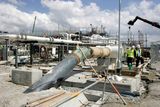Regional tech collaboration is key to success on a global scale
Killybegs Marine Cluster is one example in the collaborative eco-system
Collaboration and working in partnership with stakeholders are central planks to our impressive innovative enterprise ecosystem. This collaborative approach is both unique and critically important to deepening our enterprise capabilities and supporting the development of innovative initiatives.
This collaborative ecosystem is also critically important for strengthening and driving regional development here, which is a key focus of our work in Enterprise Ireland. In fact, strengthening regional enterprise development is an important element in our new strategy ‘Leading in a Changing World (2022-2024)’, where we have committed to driving increased collaboration through cluster and network development.
Central to this goal is the development of the aforementioned clusters, which are defined as being groups of companies, including at least five SMEs, working collaboratively with, where relevant, large companies, knowledge dissemination organisations, non-for-profit organisations and other economic players. These clusters have the potential to empower each other to compete for larger contracts domestically and internationally.
Read more
Clusters differ from networks, in that a cluster should stimulate innovation through an agreed workplan to drive the productivity and internationalisation, activity of enterprise and the competitiveness of the region. To define it simply, clusters emphasise collaboration in practical terms, by encouraging companies that might traditionally have competed against each other to work together on larger projects.
In fact, clusters have been identified as a key feature of the EU economy. Over 3,000 clusters in Europe are now responsible for 1 in 4 jobs and half of all exporting jobs. Key activities of EU clusters include cross sectoral collaboration, support for SMEs and internationalisation of its industry members.
Under Project Ireland 2040, the Irish Government identified an ambition to build sectoral clusters of SMEs at a regional level. In Budget 2019, a multi-annual fund for Regional Technology Clustering was announced, which was administered by Enterprise Ireland. The Regional Technology Clustering Fund recognised that connectivity and engagement between enterprise and regionally based knowledge providers drives productivity and competitiveness in and across regions.
Since this was launched three years ago, 12 Educational Outreach or Cluster Managers have been appointed in various Institutes of Technology (IoTs) and Technological Universities (TUs) across Ireland. And each cluster manager is sectorally aligned and engages with SMEs, multinationals and start-up clients across their region and nationally.
The formation of clusters enhances SME competitiveness and productivity, while supporting their international activity. Plus, as the clusters are housed in the IoTs/TUs and funded by Enterprise Ireland, this strengthens their members ability through this ecosystem, by enabling them to tap into research, educational and enterprise supports. These supports also come from other partners in the ecosystem such as LEOs, local authorities and relevant sectoral partners such as Bord Bia, Department of Agriculture, Educational and Training Boards, Skillnet, Coillte and Cross Border Partnerships.
Enterprise Ireland works with these 12 highly skilled Educational Outreach Managers on an ongoing basis to monitor how they are engaging with industry and their work on establishing appropriate collaboration projects.
Examples of these clusters include the Killybegs Marine Cluster, the Construction Cluster Ireland based in TUD, Wood Connect in ATU Letterfrack, Agritech & Circular Bio Economy based in MTU Tralee, Cyber Security based in MTU Cork, and the Medtech and Connected Heath clusters in ATU Galway and DKIT. New Industry 4.0 Clusters and Manufacturing and Engineering clusters are forming in TUS Limerick, Midlands, ATU Sligo and SETU Carlow.
Since mid-2021, the 12 cluster managers have engaged with over 2,500 SMEs and MNCs. Now, over 400 industry partners are signed up as full members and active members of these clusters include the Kerry Group, Dairymaster, Multihog, Bausch & Lomb, Blue Drop Medical and Boston Scientific.
These clusters are already having a significant impact, proving that collaboration is the key to global success. Companies interested in finding out more can read more at enterprise-ireland.com/en/funding-supports/regional-technology-cluster-fund/rtcf/
Gillian Slattery is Senior Regional Development Executive, Mid-West Region, Enterprise Ireland
Join the Irish Independent WhatsApp channel
Stay up to date with all the latest news














